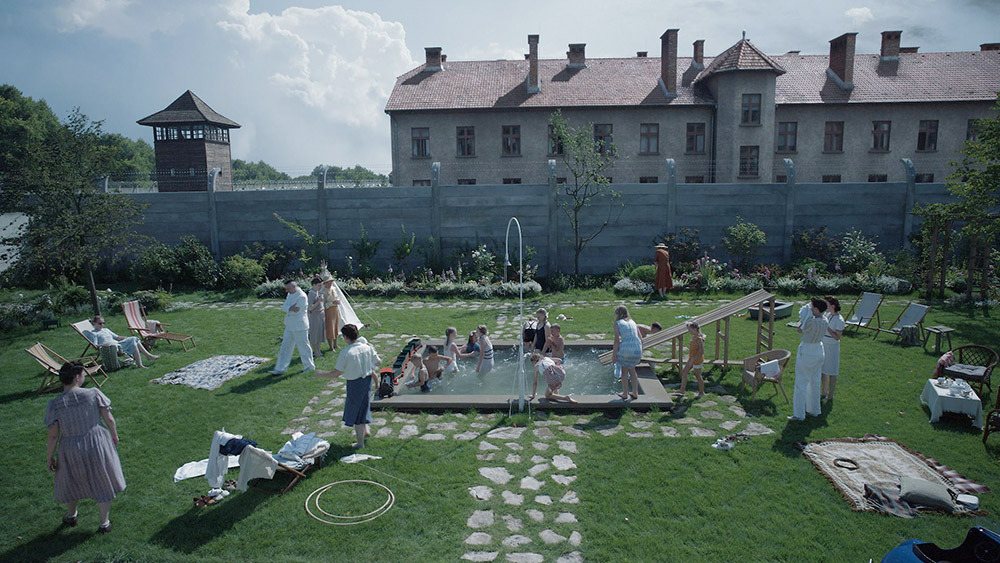
A scene from the film "The Zone of Interest" (Courtesy of A24)
Visitors to the Auschwitz-Birkenau memorial site in Poland can spot homes not far from the former camp's perimeters. When I visited Auschwitz in 2022, I was a bit stupefied — who, I thought, could possibly live so close to a onetime extermination camp? I asked the question again when I returned to Auschwitz while visiting Poland last month.
But "The Zone of Interest" — which was filmed at Auschwitz and won the Oscar earlier this week for best international feature film — asks a more disturbing and damning question: What was it like to live at Auschwitz if you were part of the camp's machinery of death?
This novel, understated and yet ultimately terrifying movie is unlike any Holocaust film I can recall — far, far different from say, "Schindler's List" or "The Pianist," both of them Oscar winners. ("Schindler's" director Steven Spielberg has praised the new movie as the best Holocaust film since his own.)
Rather than portraying any immediate horrors, we see a story focused on implied horrors. It spotlights the domestic life of the camp's commandant and his family – in this case, the real-life Rudolf Höss, portrayed by German actor Christian Friedel. Höss was twice commandant at Auschwitz and was ultimately executed by Polish authorities for war crimes.
Advertisement
The narrative, based loosely on a novel by the late Martin Amis, follows the Höss family in the course of their lives. We witness a summer lakeside idyll; sheets drying in the wind; children doing schoolwork; the visit of an in-law; Höss and his wife, Hedwig, kissing.
The film is largely set at the Höss residence next to the camp — by design, the camp's horrors are kept at a distance, as we experience what life might have been like for the family as it proudly adheres to Adolf Hitler's vision of Germans embracing a new life in the occupied East — the inverse of the vision of the American frontier, which looked westward.
One of the family members describes going east as something of a dream life — the home in Auschwitz is a symbol of comfort and status for the Höss family.
Yet the horrors of the camp, though obscured and only obliquely suggested, are never fully erased. Though at a remove, we hear distant gunshots; hear, and fleetingly glimpse, arriving trains with their human cargo; and also see smoke billowing from the crematoria.
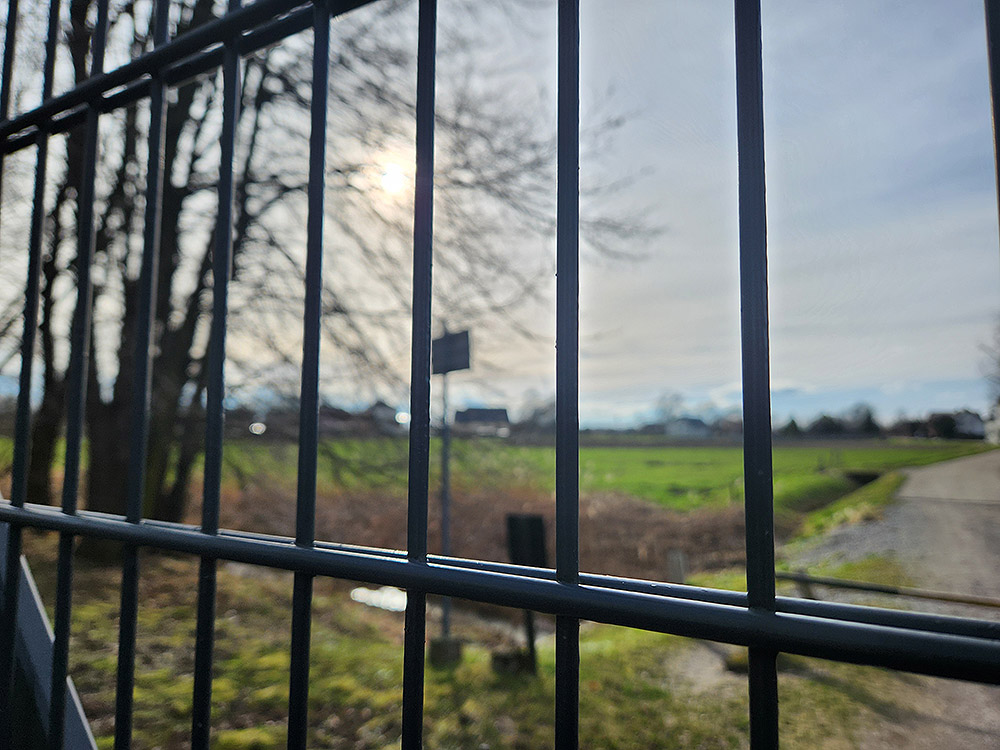
The back gates of Auschwitz as seen today, with nearby houses in the background (NCR photo/Chris Herlinger)
We also witness a moment of panic. Höss and two of his children are enjoying an afternoon river outing when, to his horror, Höss realizes body parts are floating in the river and immediately orders his children out of the water — and, tellingly, doesn't seem to explain the reason for his panic. (His children are apparently not that naive, however. One of Höss' young sons is seen in bed, curiously examining a set of one victim's teeth, somehow ill-gotten from the camp.)
I suspect most people seeing the film by now will go into it knowing the film's basic premise, and might be struck, as I was, particularly the second time I saw it, by the utter banalities of conversations among the Höss family and their visitors — chatter about meals and recipes, the hours of travel to from major cities to Auschwitz (Oświęcim in Polish) and the like.
And yet some of those domestic moments are telling — and even quietly gripping. A major turn in the film comes from the appearance of Höss' mother-in-law. Her visit begins innocently enough, with the older woman marveling at the life her daughter and son-in-law have created for themselves. "You have really landed on your feet, my child," the older woman warmly tells Hedwig in the family garden, the daughter's particular pride.
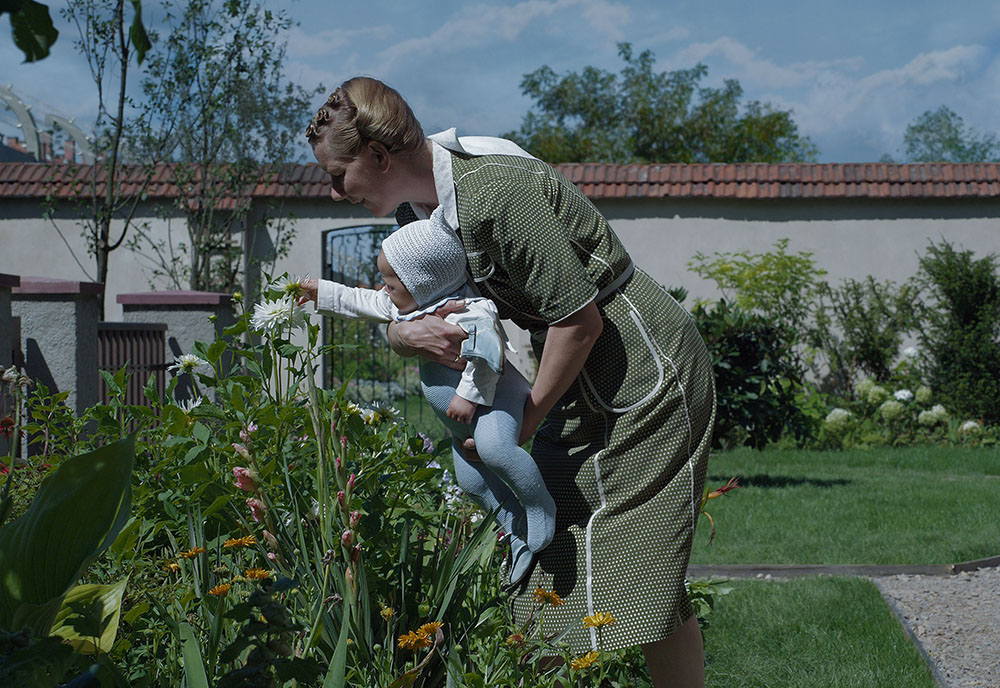
Sandra Hüller as Hedwig Höss in "The Zone of Interest" (Courtesy of A24)
Yet menace intrudes: the mother-in-law wonders if a former employer of hers, a Jewish woman, is now among those "across the wall" in the camp. Her meaning is a bit murky, suggesting that Hedwig's mother thinks the woman might be merely a prisoner in the adjoining camp rather than a victim of genocide.
To be clear: There were several parts of the Auschwitz complex, and the family's residence was located next to the first Auschwitz site, which was initially a prison camp; the second one, Birkenau, was the center of the massive machinery of death — the site of railroad platforms, gas chambers and crematoria — and was less than 2 miles away from the first camp.
Slowly, Hedwig's mother comes to realize the implications of the life Hedwig and Rudolf have embraced. During an afternoon of lounging in the garden, the woman sees the smoke from the crematoria in Birkenau. Later, at night, the full fury of the glowing flames and smoke from the crematoria startle, and then, unsettle and disturb her. Irate, she departs the residence without confronting her daughter, leaving a letter that we don't see — and that the daughter eventually burns in a stove.
From that, we come to realize that even estrangement from her mother is not enough to deter Hedwig from clinging to her new life in the East.
Hedwig's love of her Auschwitz home shapes a great deal of the film's narrative. And in fact, before her mother visited, Hedwig, portrayed by German actress Sandra Hüller, convinced her husband that she and the children should remain at Auschwitz while he is transferred and promoted to another position in Berlin.
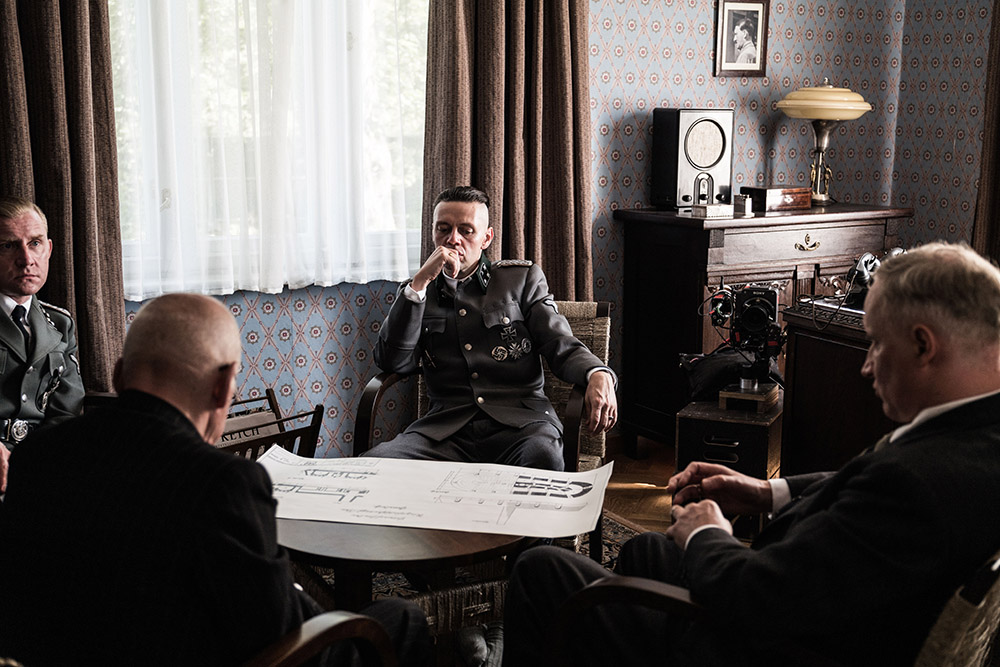
Christian Friedel as Rudolf Höss in "The Zone of Interest" (Courtesy of A24)
Eventually, though, Höss returns to Auschwitz to oversee what was one of the camp's final horrific milestones — the death of some 400,000 Hungarian Jews who were deported to Auschwitz in just eight weeks, from May to June 1944. Höss, an SS member since 1934, was acclaimed by the German command for his overseeing the expansion of Auschwitz into a center of mass murder and was proud that this final massive operation was called the eponymous Operation Höss.
Ever the company man, Höss calls his wife to tell her the news of his return to Auschwitz; she is delighted and relieved. This casual conversation between the couple is not surprising, but is still chilling. As are the film's final moments when Höss, a solitary figure, leaves a social gathering alone and seems to retch as he walks down a staircase.
Though the film has been widely acclaimed, it has had its detractors, one of the most prominent being New York Times critic Manohla Dargis. In a December 2023 review, Dargis asked what the film's point was, saying that director and writer Jonathan Glazer has "made a hollow, self-aggrandizing art-film exercise."
Yes, the film can come off as cold, perhaps even clinical. And perhaps Glazer doesn't get beyond a certain point with the two lead characters, who seem to be emotionally hollow and spiritually dead — it is known that both Rudolf and Hedwig Höss were committed anti-Semites. Still, Friede and Hüller provide memorable performances of two damaged humans who, in their moral blindness and vacuity, are missing some essential humanity. And yet, as the film makes clear, they were flesh-and-blood human beings, like you and me.
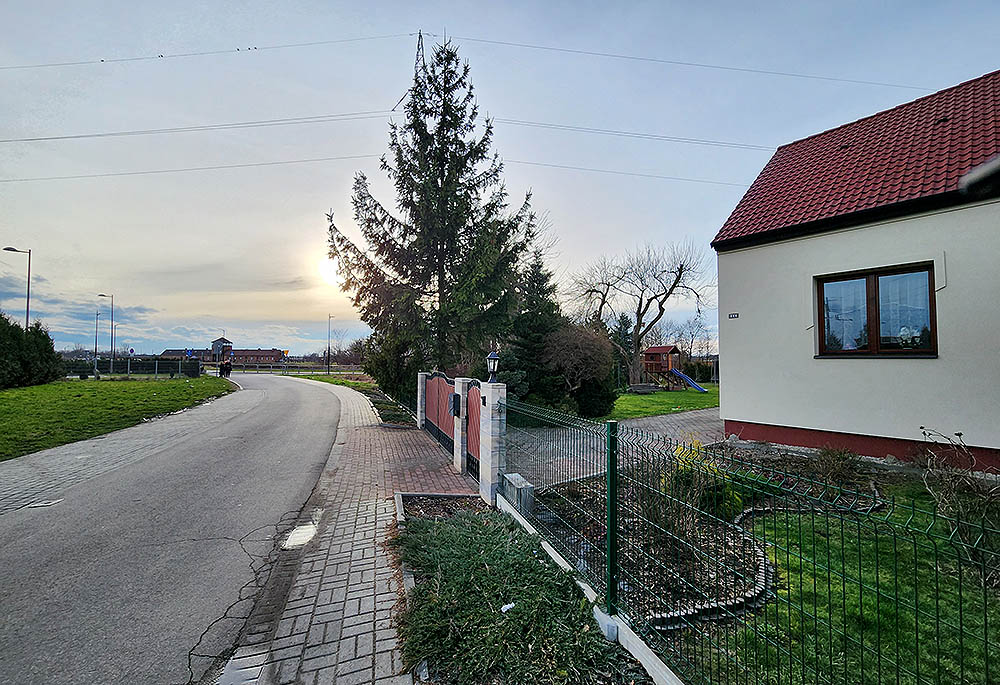
In a recent photo, a residence on the right stands not far from the Auschwitz-Birkeanau memorial site seen at left. (NCR photo/Chris Herlinger)
A legitimate question might be: Is it even possible to plumb the depths of these people? We know that the Hösses are motivated by careerism and the need for a comfortable life. But is there more? In the retching scene I just described, is Höss stricken by conscience at the immense killing about to happen under his watch? Or, as is more likely, is he unsure if the challenging task ahead will succeed?
It has become commonplace, even a cliché, to use Hannah Arendt's term the "banality of evil" to describe the life of someone like Rudolf Höss. (Arendt coined the term in the context of the trial of Adolf Eichmann, one of the key architects of the mass Hungarian deportations.)
And indeed, Höss said after his arrest — and like Eichmann would later say during his 1961 trial in Israel — that he was but "a cog in the machine." Interestingly, though, Höss acknowledged, prior to his execution by hanging in April 1947, that he had committed grave sins. And just days before his death, Höss, who was baptized and raised Catholic, was received again into the church.
Might those events make a good movie? Possibly. For now, in evoking the utter moral emptiness of callous individuals complicit in the worst of humanity — and yet were very human figures themselves — the creators of "The Zone of Interest" have done us a favor. They have given us one of the strangest and unsettling (but illuminating) Holocaust films yet made.
"The Zone of Interest" is now available on several paid streaming services, including YouTube, Fandango at Home, Google Play and Amazon Prime Video.








